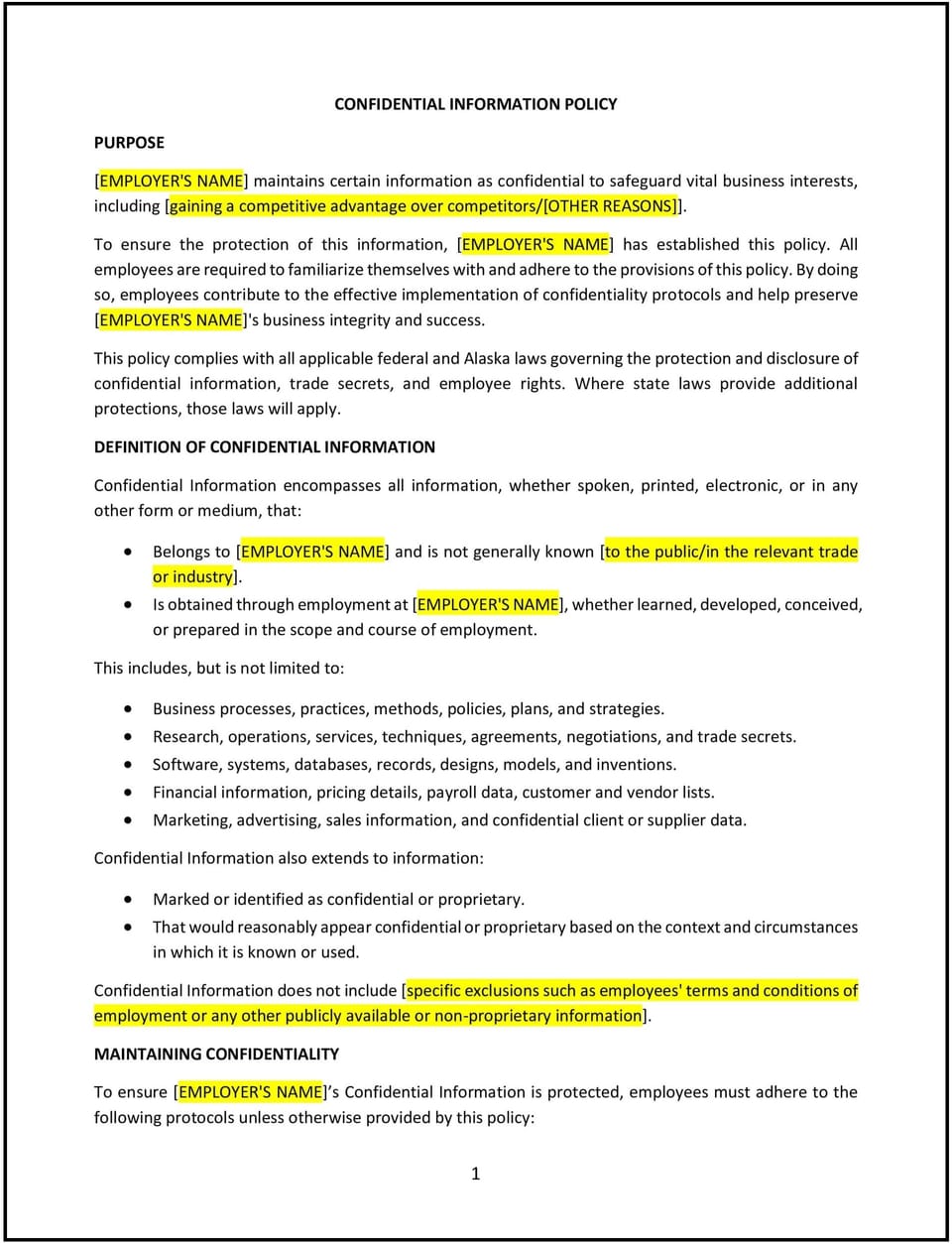Confidential information policy (Alaska): Free template

Confidential information policy (Alaska)
In Alaska, a confidential information policy outlines guidelines for protecting sensitive business information and ensuring employees understand their responsibilities in maintaining confidentiality. This policy helps safeguard proprietary data, trade secrets, client information, and other sensitive materials from unauthorized access or disclosure. By implementing a clear confidential information policy, businesses can protect their competitive edge while fostering trust with clients and stakeholders.
Alaska’s unique industries, such as resource extraction, tourism, and remote operations, may require tailored provisions to address sector-specific confidentiality concerns or challenges in handling sensitive information across dispersed locations.
How to use this confidential information policy (Alaska)
- Define confidential information: Clearly specify what constitutes confidential information, such as business strategies, customer data, employee records, trade secrets, or financial details.
- Set employee responsibilities: Outline employee obligations to protect confidential information, including proper handling, storage, and communication protocols.
- Address access controls: Establish guidelines for granting and revoking access to confidential information, ensuring only authorized personnel can view sensitive data.
- Provide procedures for breaches: Include steps employees must take to report suspected or actual breaches of confidentiality, along with the company’s response process.
- Ensure clarity in communication: Share the policy during onboarding and regularly reinforce its importance through training or updates.
Benefits of using a confidential information policy (Alaska)
A confidential information policy provides numerous benefits for businesses in Alaska. Here’s how it helps:
- Protects proprietary data: Safeguards sensitive information, reducing the risk of leaks or unauthorized disclosures that could harm the company’s reputation or competitive position.
- Encourages trust: Demonstrates to clients, employees, and stakeholders that the company is committed to protecting their information.
- Supports compliance: Helps businesses meet legal and contractual obligations to protect confidential data, reducing the risk of penalties or legal disputes.
- Minimizes risks: Reduces the likelihood of insider threats or accidental disclosures by providing clear guidelines on information handling.
- Enhances operational efficiency: Establishes consistent protocols for managing sensitive data, ensuring all employees understand their responsibilities.
Tips for using a confidential information policy (Alaska)
- Tailor definitions: Customize the policy to reflect the types of confidential information relevant to your industry, such as intellectual property in resource extraction or client data in tourism.
- Emphasize cybersecurity: Include provisions for protecting digital information, such as encryption, secure passwords, and restricted access for remote employees.
- Conduct regular training: Provide ongoing education to ensure employees understand the policy and are aware of the latest best practices for handling sensitive data.
- Monitor and enforce: Regularly review compliance with the policy and take appropriate action in cases of non-compliance or breaches.
- Update as needed: Revise the policy periodically to reflect changes in laws, technology, or business operations.
Q: What types of information are considered confidential under this policy?
A: Confidential information may include business plans, trade secrets, financial data, employee records, client details, and other sensitive materials specific to your operations.
Q: How should employees handle confidential information?
A: Employees should follow the policy’s guidelines for secure storage, controlled access, and safe communication of confidential information, whether in physical or digital formats.
Q: What should employees do if they suspect a confidentiality breach?
A: Employees must immediately report suspected breaches to their manager or the appropriate department, following the reporting procedures outlined in the policy.
Q: How does this policy apply to remote work?
A: Remote employees must follow additional security measures, such as using encrypted networks, safeguarding devices, and ensuring that workspaces are secure and private.
Q: How often should this policy be reviewed and updated?
A: The policy should be reviewed at least annually or whenever there are significant changes in laws, technology, or business operations that impact confidentiality requirements.
This article contains general legal information and does not contain legal advice. Cobrief is not a law firm or a substitute for an attorney or law firm. The law is complex and changes often. For legal advice, please ask a lawyer.


